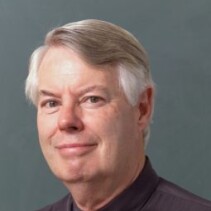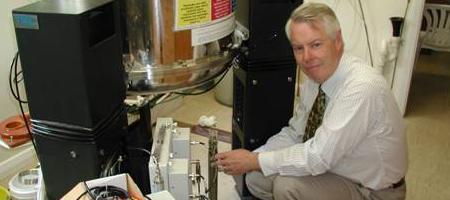
Professor Kenneth J.D. MacKenzie
Emeritus Investigator
- Phone:
- +64 4 463 5885
- Fax:
- +64 4 463 5237
Address:
School of Chemical and Physical Sciences
Victoria University of Wellington
PO Box 600
Wellington 6140
Biography
Professor Ken MacKenzie was born in Wellington and is an alumnus of Victoria University of Wellington, from which he graduated PhD in solid state chemistry in 1967 and was awarded the degree of DSc in 1976 for his contributions to the high-temperature solid state chemistry of minerals-based materials. He was a founding Principal Investigator of the MacDiarmid Institute.
For more than 50 years he has initiated and actively researched all the major classes of ceramic materials, including traditional clay-based ceramics, cements, glasses, electronic ceramics, engineering and aerospace ceramics, bioceramics, and, for the last 20 years, environmentally friendly materials (inorganic polymers and materials with structures mimicking nature).
These materials play a vital role in improving every aspect of people’s lives, their health, their means of communication and entertainment, their housing and the purity of their water supplies. They also have the potential to improve and protect the quality of the environment and reduce the carbon footprint of human activity.
Over a long period, Professor MacKenzie’s development of these types of ceramic materials has underpinned the major developments in the production of technical ceramic materials in New Zealand, including the highly successful commercial production of SiAlON engineering ceramics by Pyrotek New Zealand and the development of ecologically-friendly concrete. At his induction in 2007 as an Academician of the Science Division of the World Academy of Ceramics, he was described by the Academy President as “the international face of New Zealand ceramic materials research”.
After a three-year post-doctoral period in the UK with Professor James White at the Department of Ceramics, University of Sheffield, he returned to a position in NZ with DSIR Chemistry Division in the Physical Chemistry Section, of which he became Section head in 1978. From 1976-78 he was seconded from the NZ Government to the Materials and Energy Centre, Tehran, Iran, as a Visiting Research Professor, to establish a ceramics research group.
At other times he has spent periods as a Visiting Research Professor at the Chemistry Department, University of British Columbia, Vancouver, Canada (1991), Distinguished Visitor at the Faculty of Engineering, Hokkaido University, Japan (1995), Visiting Research Fellow at the Materials Division, German Aerospace Centre, Bonn (1998), Visiting Professor at the Department of Metallurgy and Ceramics Science, Tokyo Institute of Technology, Japan (2005), and as a Distinguished Professorial Visitor, Department of Energy, Environment and Materials, King Mongut’s University, Bangkok, Thailand (2016).
At the heart of Professor MacKenzie’s materials research career is his longstanding contribution to development multinuclear solid state nuclear magnetic resonance spectroscopy and its application to inorganic materials by probing their constituent atoms at their deepest level. This work was continued when in 1998 he was awarded a 2-year Royal Society of New Zealand James Cook Research Fellowship to the Department of Materials, University of Oxford University, UK. There he and Professor Mark Smith of Warwick University wrote an authoritative textbook on Multinuclear Solid State NMR of Inorganic Materials which continues to be consulted by researchers today.
In 2002, Professor MacKenzie joined the Academic staff of the School of Chemical and Physical Sciences at Victoria University of Wellington, being promoted to full Professor in 2006.
In this capacity he has trained and mentored some of New Zealand’s leading materials scientists. His research group also regularly hosted and trained many overseas scientists and students, particularly from less-developed countries including Iran, Cameroon and Thailand.
He is a past chairman of the Wellington Branch of the NZ Institute of Chemistry, and chaired the 2011 Fellowship panel of the Royal Society of New Zealand. He has regularly represented New Zealand on the organising committees of international conferences and continues to be an advisory board member and reviewer for more than 12 international journals.
As an acknowledged authority in the field of solid-state NMR spectroscopy he continues to be regularly consulted by colleagues in both developed and less-developed countries, including USA, Japan, Germany, UK, Thailand, Iran, Cameroon and Mongolia, reflecting the truly international nature of his research. His work has been published in more than 350 research papers in many high-impact peer-reviewed materials science journals, including an early-career paper in “Nature” and in 10 book chapters.
He has regularly represented New Zealand in the area of materials science by presenting more than 80 invited plenary lectures to international conferences. He has also made his research in materials science accessible to the NZ public by talks to social groups, service clubs, teachers and school groups and other organizations, through radio and TV interviews, and in an article in the NZ Geographic magazine.
Professor MacKenzie’s contributions to materials chemistry over a long period have been recognized by a number of prestigious medals and prizes:
- NZ Institute of Chemistry Easterfield Medal (1976)
- Ministerial Award for Excellence in Technological Development (1989)
- Shell Prize for Industrial and Applied Chemistry (1990)
- ICI Medal for Excellence in Chemical Research (1990)
- Royal Society of NZ Medal for Excellence in Science and Technology (1997)
- NZ Association of Scientists Shorland Medal for Basic or Applied Research (2003)
- Royal Society of NZ Hector Medal (2003).
- Elected Fellow of the New Zealand Institute of Chemistry (1983)
- Awarded a Royal Society of New Zealand James Cook Research Fellowship to Oxford University (1998-2000)
- Elected Fellow of the Royal Society of New Zealand (2002)
- Elected Academician of the World Academy of Ceramics (2007)
Research interests
Advanced inorganic materials, solid state chemistry, solid-state NMR spectroscopy.
Development and structure of novel advanced inorganic materials for applications as catalysts, engineering and structural ceramics, electroceramics, bioceramics and ecologically-friendly materials for remediation of pollution. Investigation of these materials by X-ray diffraction, thermal analysis, electron microscopy, Mossbauer spectroscopy and solid-state NMR.
His principal area of research for the last 14 years has been in the development and study of new inorganic polymers for environmental protection applications and other novel applications. He is expert in a number of experimental techniques, but particularly solid-state multinuclear magnetic resonance, about which he has written an authorative textbook.
Ceramic materials play a vital role in have the potential to improve and protect the quality of the environment and reduce the carbon footprint of human activity.
Professor Kenneth J.D. MacKenzie



